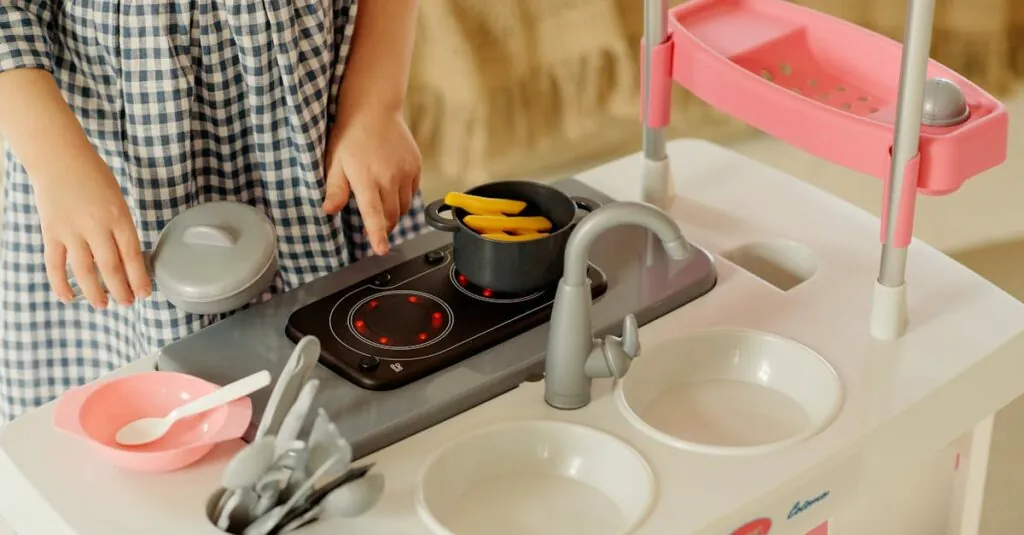Table of Contents
ToggleCooking with young children can feel like a delightful circus act—juggling ingredients, dodging spills, and navigating the occasional flour explosion. But amidst the chaos, there’s a world of fun and learning waiting to unfold. It’s not just about whipping up a meal; it’s about nurturing creativity, building confidence, and creating cherished memories that last a lifetime.
Safety First
Cooking with young children demands prioritizing safety. Ensuring a secure environment allows for a fun culinary experience without unnecessary risks.
Supervision Guidelines
Close supervision remains crucial during cooking activities. Positioning yourself nearby helps prevent accidents like burns or cuts. Engage children in discussions about kitchen hazards. Encourage them to ask questions if they feel unsure. Observing their actions can provide insights into their understanding of safety practices.
Essential Safety Gear
Outfitting children with appropriate safety gear enhances protection in the kitchen. Aprons shield clothing from spills and stains. Non-slip shoes minimize the risk of slipping on wet surfaces. Oven mitts safeguard hands from hot pots and baking trays. Safety goggles can protect eyes from splashes while cooking.
Encouraging Participation
Encouraging participation enhances the cooking experience for young children. Engaging kids in the kitchen cultivates both enjoyment and essential life skills.
Age-Appropriate Tasks
Assign tasks that match a child’s developmental stage. Young children can wash vegetables or mix ingredients in a bowl. As they grow, they can progress to chopping soft fruits or measuring dry ingredients. These simple tasks help them feel involved and valued. Safety checks before each task ensure responsible participation. Clear instructions and demonstrations provide encouragement. Adult presence fosters a supportive environment, allowing gradual skill-building.
Building Confidence in Skills
Building confidence in skills happens through practice and recognition. Children thrive on positive reinforcement when they complete tasks. Praising their efforts encourages them to try more challenging jobs. After successfully completing a recipe, celebrating their accomplishments fosters pride. Giving them some independence during cooking promotes self-reliance. Allowing them to take the lead in simple recipes enhances their agency. The combination of guidance and freedom builds their confidence in the kitchen.
Setting Up the Kitchen
Preparing the kitchen for cooking with young children promotes safety and enhances the overall experience. Organization and space are vital for enjoyable cooking sessions.
Organizing Tools and Ingredients
Group tools and ingredients logically to streamline the cooking process. Store utensils like spatulas, measuring cups, and mixing bowls within easy reach. Place commonly used ingredients, such as flour, sugar, and spices, in labeled containers to encourage accountability. Storing child-friendly tools separately helps children identify their cooking items. Keep potential hazards like sharp knives or hot pans out of children’s reach, ensuring a safe workspace. With everything organized, children feel more equipped to participate.
Creating a Kid-Friendly Workspace
Designate a cooking zone tailored for young children’s comfort and engagement. Use a sturdy step stool to help them reach counters or tables safely. Clear unnecessary items off the counter or table to minimize distractions. Brightly colored utensils or fun, themed aprons increase interest and excitement. Providing age-appropriate seating ensures that they can comfortably assist in preparation tasks. Set up a small table for their projects if space allows, fostering independence and creativity. This environment encourages a positive cooking experience where children feel empowered to explore.
Teaching Techniques
Teaching young children basic cooking skills promotes confidence and independence in the kitchen. Incorporating simple tasks like washing fruits or tearing lettuce helps develop their motor skills. Stirring batter or spreading sauces allows them to practice coordination while having fun. Basic tasks introduce them to the culinary world, fostering a sense of accomplishment and curiosity. Hands-on activities keep their interest, encouraging creativity and exploration in cooking.
Understanding the importance of measurement and timing ensures successful cooking outcomes. Children learn to use measuring cups and spoons for accuracy, which enhances their math skills. Timing helps them grasp the cooking process, making them aware of how flavors develop over time. Using timers can turn waiting into a game, helping kids stay engaged. Celebrating their ability to follow recipes enhances their confidence, ensuring they realize that precision leads to tasty results.
Cultivating Healthy Habits
Cooking with young children serves as an excellent opportunity for teaching nutritional habits and fostering a love for healthy foods.
Nutritional Education
Teaching children about nutrition plays a crucial role in their healthy development. Kids learn about fruits, vegetables, lean proteins, and whole grains through hands-on experiences. Engaging discussions about where food comes from enhances their understanding of healthy eating. For instance, children can help create a colorful salad, discussing the benefits of each ingredient as they chop and mix. Labeling foods with fun facts makes this learning process engaging. Incorporating these lessons encourages healthier food choices and cultivates lifelong habits.
Fun with Healthy Ingredients
Incorporating healthy ingredients into cooking encourages creativity and excitement. Choosing colorful fruits and vegetables can turn meal prep into an enjoyable adventure. For example, arranging fruit kabobs or creating vegetable faces enhances visual appeal and makes healthy eating fun. Exploring new recipes featuring wholesome ingredients allows kids to take ownership of their meals. By experimenting with herbs and spices, they learn about flavors and enhance palatability. Adventurous cooking experiences help children develop a positive relationship with food while discovering nutrition in enjoyable ways.
Cooking with young children is a rewarding journey filled with laughter and learning. It’s essential to create a safe and engaging environment that encourages exploration and creativity. By assigning age-appropriate tasks and celebrating their achievements, children gain confidence and develop valuable skills.
Fostering an understanding of nutrition through hands-on experiences not only makes cooking enjoyable but also instills lifelong healthy habits. With the right approach, parents can transform the kitchen into a space of discovery where children feel empowered and excited about food. Embracing the chaos can lead to cherished memories and a love for cooking that lasts a lifetime.





